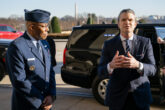September 21, 2019
How to Make the U.S. Military Weak Again
No-first-use, or the idea that the United States should not use nuclear weapons unless first attacked with them, has gained traction everywhere from the House Armed Services Committee to the Democratic presidential debates. Proponents of a no-first-use policy present it as a common-sense solution that would reduce the likelihood of nuclear war and signal U.S. leadership on nuclear proliferation. The reality, however, is that a no-first-use policy would upend decades of bipartisan consensus at precisely the moment when continuity in nuclear policy is needed most. America’s adoption of a no-first-use policy would be bad for the United States, worse for our allies, and terrible for the cause of nuclear nonproliferation in an era of strategic competition with China.
First, a no-first-use policy would weaken our military posture in the face of a wide array of chemical, biological, and cyberattacks. Under the rules of engagement outlined by the no-first-use policy, the United States could suffer a biological attack killing thousands of troops stationed abroad, a chemical attack killing hundreds of thousands of civilians in San Francisco, and a crippling cyberattack on America’s nuclear infrastructure and still be unable to respond with nuclear force. A no-first-use policy would place a needless restriction on the country even when nuclear force would be the best option to deter further aggression.
And far from reducing the probability of nonconventional warfare, America’s adoption of a no-first-use policy would make nonconventional warfare likelier. Adversaries, emboldened by the knowledge that even the most brazen attacks on the United States no longer carry the risk of an American nuclear strike, would feel more confident in testing the upper boundaries of what they could get away with. In short, a no-first-use policy would leave the United States less able to respond to exactly the kind of biological, chemical, and cyber brinksmanship it would invite.
Read the full article in The National Interest.
More from CNAS
-
National Security Human Capital Program
Defending the Army’s Command Assessment ProgramThe concept for CAP — developed during the first Trump administration — benefited from the guidance, input and oversight from the foremost scholar and practitioner on military...
By Katherine L. Kuzminski
-
National Security Human Capital Program
‘Women Don’t Just Achieve…They Excel’: Fmr. Marine Corps Attack PilotDr. Kyleanne Hunter, former Marine Corps attack pilot and CEO of Iraq & Afghanistan Veterans of America, says “women are the fastest growing group of veterans” and “the fastes...
By Dr. Kyleanne Hunter
-
National Security Human Capital Program
Could the U.S. Bring Back the Draft?In this episode of At the Boundary, GNSI’s Dr. Guido Rossi sits down with Katherine Kuzminski, Director of Studies at the Center for a New American Security (CNAS), to explore...
By Katherine L. Kuzminski
-
National Security Human Capital Program
Hegseth Brings the Culture War to CombatThe fundamental challenge of military leadership lies in creating cohesive teams that can work together in an environment of mortal risk and, when called upon to do so, use le...
By Dr. Jason Dempsey




